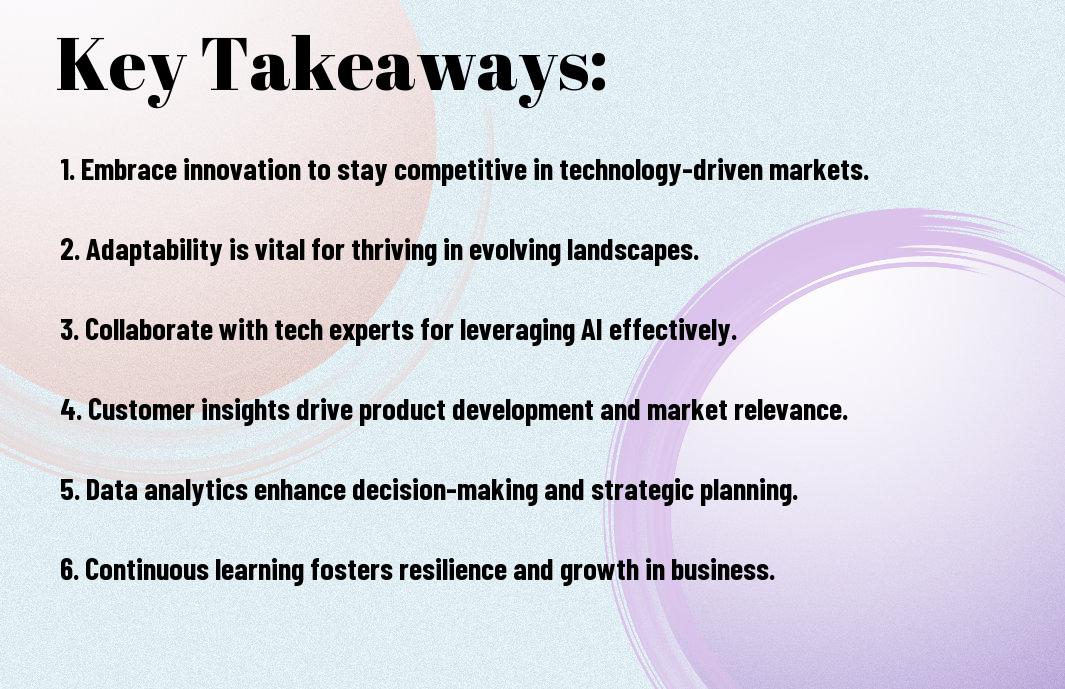As you navigate the rapidly evolving business landscape, you’re likely wondering how to leverage artificial intelligence to drive your venture forward. Your ability to adapt and innovate will be key to staying ahead of the curve. You’ll need to understand how AI is transforming industries and identify opportunities to harness its power. In this post, you’ll gain valuable insights from entrepreneurs who have successfully integrated AI into their businesses, and learn how to apply these lessons to achieve your own success.
Key Takeaways:
- Embracing AI technology is important for entrepreneurs to stay competitive in today’s fast-paced business landscape, as it enables them to automate tasks, gain insights, and make data-driven decisions.
- Developing a deep understanding of AI and its applications is vital for entrepreneurs to identify opportunities and challenges, and to create innovative solutions that leverage AI capabilities.
- Building a strong team with diverse skills, including AI expertise, is necessary for entrepreneurs to successfully develop and implement AI-powered products and services.
- Entrepreneurs must prioritize ethics and responsibility when developing and deploying AI systems, ensuring that they are transparent, fair, and respectful of user data and privacy.
- Staying adaptable and agile is key for entrepreneurs to navigate the rapidly evolving AI landscape, as they must be prepared to pivot and adjust their strategies in response to new technologies and market trends.

The New Entrepreneurial Landscape
Before entering the entrepreneurial arena, you need to understand the shifting dynamics of the business world. The AI era has brought about significant changes, and you must be prepared to adapt and innovate to succeed.
AI as the Great Equalizer
Generally, AI has leveled the playing field, allowing small businesses and startups to compete with larger corporations. You can now access advanced technologies and tools, enabling you to scale and grow your business more efficiently.
The Velocity of Change
Against the backdrop of rapid technological advancements, you must be agile and responsive to changing market conditions. You need to stay ahead of the curve, anticipating and adapting to new trends and innovations.
This velocity of change requires you to be highly adaptable and open to new ideas and strategies. You must be willing to pivot your business model, products, or services to stay relevant in a rapidly evolving market. By doing so, you can capitalize on new opportunities and stay ahead of the competition, ultimately driving your entrepreneurial success in the AI era.
First-Principles Thinking
Now, as you navigate the AI era, you’ll need to adopt a mindset that allows you to challenge conventional wisdom and think creatively. This involves breaking down complex problems into their fundamental components and solving them from the ground up.
Questioning Assumptions
For instance, you should constantly question the assumptions that underlie your business model and be willing to pivot when necessary. By doing so, you’ll be able to identify new opportunities and stay ahead of the competition.
Building from the Ground Up
On the other hand, building from the ground up allows you to create a solid foundation for your business, unencumbered by legacy systems or outdated thinking. You can design and optimize each component to work seamlessly together, creating a more efficient and effective whole.
Plus, when you build from the ground up, you have the opportunity to incorporate AI and other emerging technologies into the very fabric of your business, enabling you to innovate and adapt more quickly to changing market conditions, and ultimately, driving your entrepreneurial success.
Adaptation Over Perfection
Not every entrepreneurial venture will be a perfect, polished product from the start. You will encounter setbacks and make adjustments as you navigate the AI era.
The Minimum Viable Product Philosophy
Among the strategies you can employ is launching a minimum viable product, allowing you to test and refine your offering based on user feedback, helping you to adapt quickly to changing market conditions.
Iterative Growth Cycles
By embracing iterative growth cycles, you can continuously evaluate and improve your product or service, ensuring it meets the evolving needs of your customers and stays competitive in the market.
In addition, as you progress through these cycles, you will gather valuable insights and data, enabling you to make informed decisions about your business, and driving your entrepreneurial success in the AI era, allowing you to stay ahead of the curve and achieve your goals.
Data as the New Currency
Many entrepreneurs are now recognizing the value of data in driving business decisions and gaining a competitive edge. You can leverage data to inform your strategy, optimize operations, and create new opportunities for growth. As you navigate the AI era, your ability to collect, analyze, and apply data will be important to your success.
Harvesting Meaningful Insights
Upon closer examination, you’ll find that data holds the key to unlocking meaningful insights that can transform your business. You can use data analytics tools to identify trends, patterns, and correlations that inform your decision-making and drive innovation. By doing so, you’ll be able to refine your strategy and stay ahead of the curve.
Ethical Considerations
Any entrepreneur operating in the AI era must consider the ethical implications of data collection and usage. You need to ensure that your data practices are transparent, secure, and respectful of users’ privacy. As you develop your data strategy, you should prioritize ethical considerations to maintain trust and avoid potential pitfalls.
Hence, as you probe deeper into the world of data-driven decision-making, you’ll need to balance the benefits of data analysis with the potential risks and consequences. You should establish clear guidelines and protocols for data collection, storage, and usage, and invest in robust security measures to protect sensitive information. By doing so, you’ll be able to harness the power of data while maintaining the trust and integrity of your business.

The Human Element
Unlike other factors that contribute to entrepreneurial success, the human element is often overlooked in the AI era. You must prioritize your team’s skills and abilities to stay competitive.
Emotional Intelligence in the AI Age
Along with technological advancements, you need to develop emotional intelligence to effectively lead and manage your team in this new landscape, ensuring you make informed decisions that balance human and artificial intelligence.
Building Teams That Complement Technology
With the rise of AI, you should focus on building teams that complement technology, rather than replacing it, to maximize efficiency and innovation in your organization.
Complement your technology with a team that possesses skills such as creativity, problem-solving, and adaptability, allowing you to leverage AI’s capabilities while maintaining a human touch, and you will be able to drive your business forward in the AI era, making the most of the unique strengths that both humans and machines bring to the table.
Funding in the AI Ecosystem
Once again, you find yourself at the forefront of innovation, navigating the complex landscape of funding in the AI era, where traditional models are being disrupted and new opportunities are emerging, allowing you to capitalize on your vision.
New Venture Capital Paradigms
To succeed, you need to understand the evolving venture capital landscape, where AI-focused funds and investors are looking for startups that can leverage AI to drive growth and returns, and you must be prepared to demonstrate your AI strategy to secure funding.
Alternative Financing Routes
Along with traditional venture capital, you can explore alternative financing options, such as crowdfunding, angel investors, and corporate venture arms, which can provide the necessary capital to fuel your AI-driven venture, and you should consider these options to fund your growth.
In fact, alternative financing routes can offer you more flexibility and control over your business, allowing you to maintain equity and make strategic decisions without external pressure, and you should carefully evaluate these options to determine the best fit for your AI startup, considering factors such as investment size, valuation, and investor expectations, to ensure that you secure the funding you need to drive your business forward.
To wrap up
On the whole, you now have a deeper understanding of what it takes to achieve entrepreneurial success in the AI era. You have learned valuable lessons from the front lines, and you can apply these insights to your own business ventures. As you move forward, you will be able to leverage AI to drive innovation and growth, and your ability to adapt will be key to staying ahead of the curve and achieving your goals in this rapidly evolving landscape.
FAQ
Q: What are the key characteristics of successful entrepreneurs in the AI era?
A: Successful entrepreneurs in the AI era are those who are able to adapt quickly to changing market conditions, leverage AI technologies to drive innovation, and foster a culture of experimentation and continuous learning within their organizations. They are also able to identify and capitalize on new opportunities created by AI, such as the development of new products and services, and the creation of new business models. Additionally, they are able to navigate the ethical and societal implications of AI, and prioritize transparency, accountability, and fairness in their use of AI technologies.
Q: How can entrepreneurs effectively integrate AI into their business strategy to drive growth and competitiveness?
A: Entrepreneurs can effectively integrate AI into their business strategy by starting with a clear understanding of their business goals and identifying areas where AI can add value. They should then develop a roadmap for AI adoption, which includes assessing their current data infrastructure, identifying potential AI applications, and developing a plan for implementing and scaling AI solutions. It’s also important to invest in employee education and training, to ensure that they have the skills needed to work effectively with AI technologies. Furthermore, entrepreneurs should prioritize ongoing evaluation and monitoring of AI systems, to ensure that they are delivering the expected benefits and to identify areas for improvement.
Q: What are some common pitfalls that entrepreneurs should avoid when navigating the AI landscape, and how can they mitigate potential risks?
A: Common pitfalls that entrepreneurs should avoid when navigating the AI landscape include underestimating the complexity of AI technologies, overestimating their potential benefits, and failing to consider the potential risks and downsides of AI adoption. To mitigate these risks, entrepreneurs should take a nuanced and informed approach to AI adoption, which includes conducting thorough research and due diligence, developing a clear understanding of the potential benefits and risks of AI, and prioritizing transparency, accountability, and fairness in their use of AI technologies. They should also invest in ongoing monitoring and evaluation, to ensure that AI systems are delivering the expected benefits and to identify areas for improvement. By taking a thoughtful and informed approach to AI adoption, entrepreneurs can minimize the risks and maximize the benefits of AI for their businesses.



